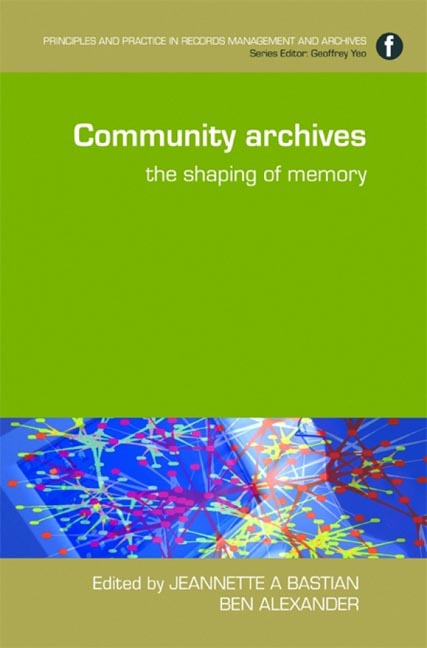Book contents
- Frontmatter
- Contents
- Introduction to the series
- Acknowledgements
- Contributors
- Introduction: Communities and archives – a symbiotic relationship
- Part 1 A community archives model
- Part 2 Communities and non-traditional record keeping
- Part 3 Records loss, destruction and recovery
- Part 4 Online communities: how technology brings communities and their records together
- 9 From Yizkor Books to weblogs: genocide, grassroots documentation and new technologies
- 10 Co-creation of the Grateful Dead sound archive: control, access and curation communities
- Part 5 Building a community archive
- Conclusion: The archivist and community
- Bibliography
- Index
- Miscellaneous Endmatter
- Miscellaneous Endmatter
- Miscellaneous Endmatter
10 - Co-creation of the Grateful Dead sound archive: control, access and curation communities
from Part 4 - Online communities: how technology brings communities and their records together
Published online by Cambridge University Press: 08 June 2018
- Frontmatter
- Contents
- Introduction to the series
- Acknowledgements
- Contributors
- Introduction: Communities and archives – a symbiotic relationship
- Part 1 A community archives model
- Part 2 Communities and non-traditional record keeping
- Part 3 Records loss, destruction and recovery
- Part 4 Online communities: how technology brings communities and their records together
- 9 From Yizkor Books to weblogs: genocide, grassroots documentation and new technologies
- 10 Co-creation of the Grateful Dead sound archive: control, access and curation communities
- Part 5 Building a community archive
- Conclusion: The archivist and community
- Bibliography
- Index
- Miscellaneous Endmatter
- Miscellaneous Endmatter
- Miscellaneous Endmatter
Summary
A lot of what we are selling is community. That is our main product …
Band lyricist John Perry Barlow, quoted in McNally, 2002, 386
Introduction
The Grateful Dead (‘Dead’) represents a 30-year travelling experiment in improvisational music and audience-band co-creation. Between 1965 and 1995 the band performed over 36,000 songs during 2317 concerts in nearly 300 cities. Beyond band member commitment, the Dead's longevity and yield also resulted from the loyalty of an ever-expanding base of supporters (‘Deadheads’) who symbiotically fuelled the band's renowned creative process. Hand in glove with this performative arc was the creation of ‘two’ complementary archives of enormous size, scope and distribution: the band's official recordings, and a much larger body of permitted and illicit in-concert audience recordings. Over the decades the band was forced to evolve its position on audience recordings. Initial disinterest and hostility gave way to a tentative acceptance, and finally to the sanctioning of an ‘Official Taper's Section’ (OTS) in 1984.
Early audience recordings were made on reel-to-reel tapes and traded hand-to-hand and through the postal system. These humble beginnings sparked ever-expanding systems of reproduction through sharing that occurred alongside the shift from analogue to digital to network technologies. All contributed to an aggregated-disaggregated taper and trader community that was in full flourish when the band disintegrated in 1995 with the death of co-founder Jerry Garcia. The rise of the internet and the world wide web caused and continues to cause seismic shifts in the scale, availability, reproduction and curation of the band's formal and informal sound archive. Nearly 15 years after the band's demise, the ongoing voluntary efforts of the taping and trading community ensure unprecedented access to performances and their metadata.
This chapter charts the history and continuing evolution of the taping and trading community, now in its fifth decade. It briefly describes the band's performance philosophy and the taping and trading sub-culture it triggered within the broader Deadhead community. A discussion of the band's institutional audio recording and archiving is followed by a more detailed analysis of the taping and trading community and its practices. This leads to an examination of the revolutionary impact of the internet and the world wide web on trading, documentation and curation.
- Type
- Chapter
- Information
- Community ArchivesThe shaping of memory, pp. 169 - 194Publisher: FacetPrint publication year: 2009
- 1
- Cited by



